
EXPERIENCING RELIGIOUS DIVERSITY IN TURKEY - Prof. Nan Goodman: Judaism here is almost entirely Turkish
University of Colorado English Professor Nan Goodmans Global Seminar description contains these words: The Muslim world has become inhospitable to Jewish communities, so much so that nearly all Jewish communities in Muslim countries have disappeared. There is only one Muslim country in the twenty-first century that has a thriving Jewish community and a group of students and scholars eager for in-depth study of their multicultural Jewish heritage. That country is Turkey.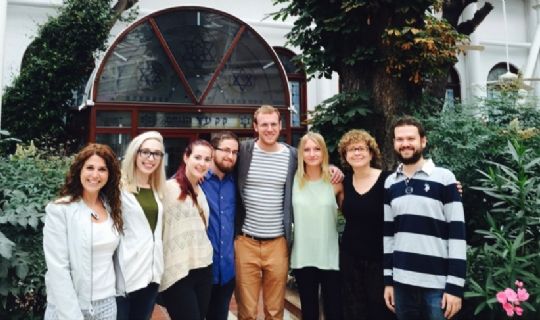
I had the privilege of talking to such group of students and a scholar visiting our country. After their two week stay in Istanbul they left with their own beautiful memories and a shared admiration for our community. Discovering a new connection to their Jewish identity was the unexpected reward for all of them.
What is the purpose of this course and why does it involve a trip to İstanbul?
The purpose of the course is to acquaint American students who are interested in religious studies, in the Muslim and Jewish world and, particularly in the Jewish world in the only Muslim country where such a community exists. And to let them understand the incredible diversity of Jewish life here and the incredible mixture of Jewish and Muslim practices, ceremonies and rituals.
With John Freely, the legendary professor of Bogazici University, you are co-authoring a book called Half Way to Jerusalem: Varieties of Jewish Experience in Turkey. I really wonder how my experience seems to you as a foreigner.
There is a difference between what I read about the Jews in Turkey, and what I see as being experienced by them. What I read is about concealment and secrets, and what I see is tremendous joy in Jewish life here. The community is very happy as being Jewish; obviously I am not meeting with Jews who don’t identify themselves being Jewish, but when I meet the Jews who do, I feel like there is a real pride in being Jewish. I met a man in the Kuzguncuk Synagogue and he was teasing with one of his friends. He said “The Sephardim have only been here for 500 years, while I, a Mizrahi have been here for 700 years.” There was this tremendous pride in him as a Mizrahi coming to this land earlier. Here the Jews as individuals feel like they are home. But as a community I think they feel under siege. They have difficulty seeing a future for their children as anti-Semitism rises. Young people seem to be leaving, but the older people seem like they are not going anywhere probably.
You brought your students here to see a “Muslim country that has a thriving Jewish community.” Considering the fact that there is growing anti-Semitism and taking into account the latest articles about Jewish immigration do you really see a thriving Jewish community in Turkey?
Not in numbers but in spirit. Of course they are the remnants of what was once a larger community. We have seen eight synagogues: Edirne, Ashkenazi, Italian, Neve Shalom, Ortakoy, Kuzguncuk in Istanbul and Mayor and Gerush Synagogue in Bursa. We know that there was once a thriving community here and people seem very spirited about their Judaism. I even felt reinvigorated. I had a new sense of being Jewish when I came here. It is ironic because the community is dying off, but it felt more alive here to me. I don’t want to whitewash the situation. I know that the community is shrinking and I acknowledge the growing anti-Semitism. It is very scary.
Can you compare Jewish life in Ottoman era and Turkish Republic era in terms of tolerance, privileges and restrictions?
It is hard to generalize about the Ottoman period because it was 600 years long. But certainly in the 17th and into the 18th century I imagine life being much richer for the Jewish population, much more open about Jewish practice. There was still oppression, but there was more respect and more acknowledgements of differences. During the early Republic with Atatürk, there was a leveling off of all religious practice, and probably it came as something of a relief for the Jews, although it might have also turned them inward. After World War I and then again during and after World War II, it has been a disaster. The brain drain from here to Israel and America and all over Europe makes me very sad because what Turkey has in terms of a Jewish population is unique.
Why do you think it is so unique?
What is amazing to me is that I hadn’t learnt about the Jewish life here until very recently, despite having been in school for a very, very long time. I didn’t know how much was here. Romaniots, Mizrahis, Sephardims, Ashkenaz, Karaims and the Sebetaists. I find it so life changing because although I am an Ashkenazi Jew from Eastern Europe I learn more about myself as a Jew here than anywhere else. I learned that there can be a difference in the paths that Jews have taken, that there is as much diversity within the Jewish community as there is outside of it. Yet the Jews cultivate differences in a way that astounds me, and that makes me realize that this is what keeps the Jewish community alive.
The Turkish Jews relative to world Jewry are very loyal to their traditions, customs and rituals. Do you think Turkish customs and way of life has any effect on that as opposed to more secular, emancipated, western style of life?
The practice of Judaism here seems extremely Turkish to me. This is what I have been trying to tell my students. From the architecture with the Moorish towers in the Ashkenaz synagogue, to the designs of art coverings to the Sepharadic food that is eaten, the music, the practice of rituals Judaism here is almost entirely Turkish. It is not at all what I grew up in America. It all seems incredibly mixed in with Turkey and even with Islam. There is such a bridge between the two religions and cultures. Last year in the Shabbat service in Ortakoy Synagogue, I saw many of the things people do in the mosques. It looks similar and it sounds similar.
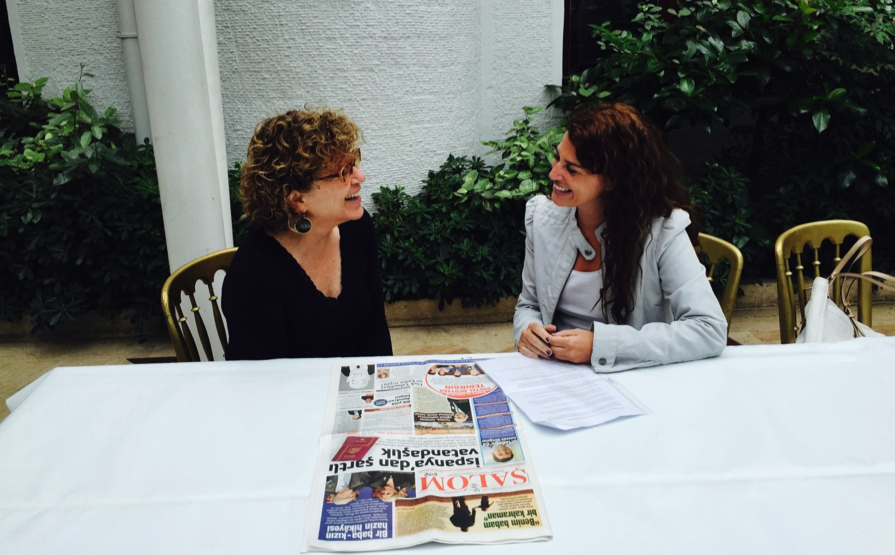
Now that Spain just approved citizenship path for Sephardic Jews what do you think about this development?
It is sad that it is something that drives the Jews away from here, but I understand it completely. It is not a good situation for the Jews here anymore and I wouldn’t blame anyone who would like to have European citizenship or seek a freer life for their kids. But is there some irony there? Yes!
It has been said that a basic level of Spanish would be required in order to be a candidate. The Jews in Turkey have managed to keep their 500 year old language intact but are still expected to learn contemporary Spanish. Is that fair?
I don’t think I am qualified to answer that. I am not a politician, but I can imagine your community’s anger. But Scott, one of my students might want to weigh in on that.
Scott: My grandmother was expelled from Germany and there is no requirement for me to learn German in order to get citizenship. My personal view is that it is unfair.
Speaking of Ladino how do you fight for a dying language?
Actually I was talking to Scott about this particular subject. He speaks Yiddish. And we were comparing Yiddish and Ladino. Yiddish was also dying out and through the efforts of a few extremely energetic people; it has really experienced a revival. There aren’t a large number of people speaking Yiddish but there are many young people now at least in America who is studying Yiddish. We have several Yiddish language groups around the country that are bringing students to places where they meet Yiddish speakers. I can see that happening very easily for Ladino. I am hopeful. Ladino has been part of almost every Jewish service I attended here. Certainly older people are delighted to speak Ladino.
Scott: The efforts of a few highly motivated people to salvage and to keep the language alive in the classroom and transmit it to the wider community would be essential. It goes a long way but it requires investment. People have to take seriously the importance of the language and to put their money where their mouth is and support it through institutions.
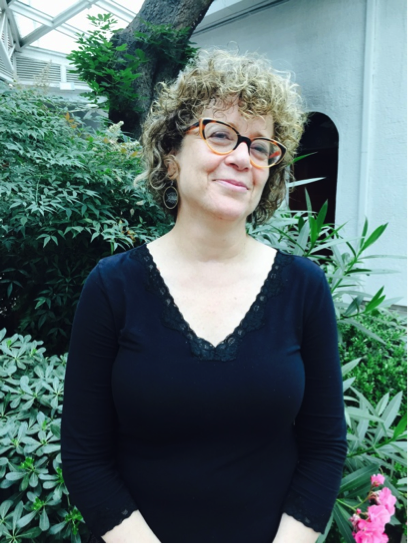
As Jews in Turkey with 500 years of history, we are a part of the so called ‘Religious mosaic’ that Turkey so boastfully celebrates. But on the other hand we are constantly questioned about our patriotism and expected not to enjoy our differences so much. We have a dilemma as to how to identify ourselves. As a scholar how would you identify us?
As a foreigner I would identify you as Jewish Turks, just as I would identify myself as a Jewish American, because there is nothing recognizably not Turkish about the Jews that I know here. So it is a big problem with the current state of Turkey and also in earlier times. It has to do with the question of tolerance, which is an ugly word. Tolerance is an ugly phenomenon. In part, the complication has come from the rest of the world, which has privileged the toleration of Jews in the Ottoman Empire as compared to the rest of the world where they were being slaughtered or expelled. But tolerance by itself as an absolute is a terrible thing. It means you are always being observed, and that you are not participating fully. To smooth over this difference, many Turkish Muslims say “oh my Jewish friends don’t consider themselves Jewish particularly, or there is nothing Jewish about them” which of course is just the flipside of saying “I don’t want to know that they are Jews, I don’t want to think about the fact that they are Jews.” And one of the most unfortunate things here in Turkey is the blurring of lines between Jews and İsraelis which has happened in the rest of the world and even in America. Israel is an important place that must exist, but it is not the sum total of all that is Jewish.
You visited Edirne Synagogue. It is a historical synagogue and its renovation has been one of the biggest gestures towards our community. But Edirne has no Jewish population. Any remarks on that?
We have been noticing the incongruity between the beauty and majesty of the synagogues and the absence of a real Jewish population. The community is fragile. We also learned that the Jews travel to all the synagogues just to keep them going. Otherwise the government will shut them down. Edirne Synagogue in particular is very large and you are struck by the emptiness of it when you walk in. But it is wonderful that they restored it. I am really happy it exists and can be used for cultural events. Jews and non-Jews can see the majesty of the synagogue. It would be better if there were Jewish people who were still living in Edirne. It is sad that Jews are leaving this wonderful country. I just hope there is some way other than restoring the buildings to keep the community alive.
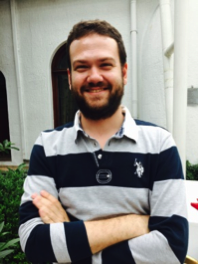
Cem Durak graduated from Bogazici University, Department of Turkish Language and Literature and he is off to University of Colorado in Boulder this September to earn a master’s degree in Religious Studies. He is Global Seminar Director Prof. Nan Goodman’s assistant. Cem contacted the Turkish officials for visiting arrangements and accompanied Prof. Goodman and her students to religious sites throughout the trip. He was kind enough to share his thoughts on Turkish Jewry.
What has amazed the American students here is the beauty that is left of a huge community, which is lost but once was here. Even that should be enough reason for Turkish Jews not to have the slightest feeling for taking Spanish citizenship. Unfortunately as Turkey, we failed against our minorities. We couldn’t make you feel equal citizens. Turkish state should have given the safety to all of its citizens that they all own the country equally. I hope for such a country where nobody would have to consider getting another citizenship.
And here are the eager students telling about what amazed them the most and sharing their memories:
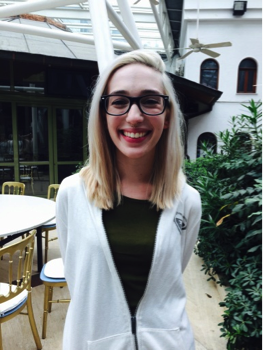
Emily
We went to Kuzguncuk Synagogue and during the Shabbat service I felt more in touch with my Jewish identity than I ever have before in my life. I cried multiple times during the prayers just because I felt closer to fellow Jews even though I don’t share a language with them. It was so heartwarming to see this welcoming community who wanted to continue on and share their love of culture and their religion here in Turkey with outsiders. They are so excited to have us there. I actually wanted to move here. We met young Jewish Turks, and they don’t identify themselves as being Turkish. But that decision has been taken away from them because Turkish people don’t consider them Turkish. When we walk into synagogues seeing the high security, having to have ID’s for entrance and hard hats underneath the seats in case something were to occur, it is heartbreaking because they are such a lively community when you are for example within the Kuzguncuk synagogue; however the reality is just fear and you don’t show you are Jewish outside of the walls. Being an American Jew it is weird for me feeling more connected to my Jewish identity here in Turkey whereas a lot of Turkish Jews must be only Jewish within certain settings. That contrast was incredible for me.
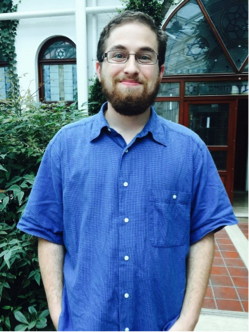
Joshua
In Kuzguncuk I was called to address the Torah and I felt so honored and flattered. Back home I do that too but here I am so unfamiliar with the gestures and rituals. There was a gentleman there who told me when to stand up and everything. Afterwards I went to try to thank him for his help and Cem was translating. The next thing I know the gentleman said “grab a pen, grab a pen” and he wrote down the address of Neve Shalom and invited us to a wedding. The wedding was very celebratory; the way they hold the Hupa was so pretty. At the end everyone was clapping and singing songs. It was so much fun.
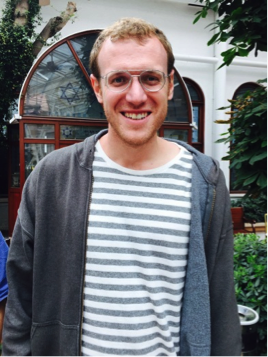
Scott
What surprised me the most coming to Turkey was the incredible hospitality we were welcomed with. In the synagogues we were included in a way that I never experienced in my own synagogues in the US. Going up and holding the Torah and reading the Torah almost moved me to tears. It shocks me that we can be separated by half way across the world and still we are greeted as brothers in Turkey.
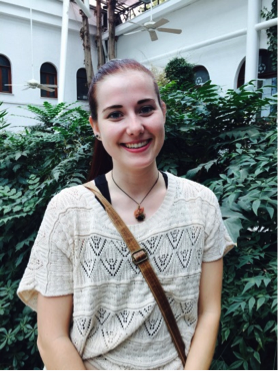
Bridgette
We were at the Bulbul Deresi Cemetry, of the ‘Donmes’. They are really interesting. We read about them in the historical context. In the past some people hid their Jewish identity behind this kind of Muslim exterior or a secular exterior except now in this modern time we see it in a different way. It is not the same as the Donme, but there still a lot of holding back their Jewish identity and letting people assume what they want to seem on the exterior. The synagogues seem as a kind of a metaphor, for they are very open, welcoming and alive in the inside but in the outside its closed away and it is very guarded and concealing their identity just like Donmes.
After these beautiful comments from the students which definitely enriched this interview, I promised them to ask Prof Goodman to give them A+. The students forced me to write this in the newspaper so that Prof Goodman would feel obligated to do so. Please accept my apology Prof Goodman, I feel empathy with the kids; but they deserve it anyway. And last but not least of all you and your students are always welcome in my country.
Related Newsss ss











